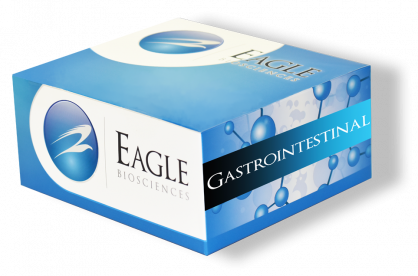Anti-Deamidated Gliadin Peptides (DGP) IgG ELISA Assay Kit
The Anti-Deamidated Gliadin Peptides (DGP) IgG ELISA Assay Kit is For Research Use Only
Size: 1×96 wells
Sensitivity: 0.13 AU/mL
Dynamic Range: 15 – 240 AU/ml
Incubation Time: 1 hour 15 minutes
Sample Type: Serum, Plasma
Sample Size: 10 µL
Controls Included
Assay Background
Celiac disease, also known as gluten sensitive enteropathy is primarily a disease of the infant organism. It is caused by a hypersensitivity reaction in response to gliadin, a protein being present in many cereals. This, non IgE mediated food allergy leads to massive malabsorption disturbances and is characterized by a complete atrophy of the villi and hyperplasia of the crypts of the upper intestine. Accordingly patients suffering from celiac disease must maintain a gluten free diet for the rest of their life.
Gliadins are proteins containing high amounts of the amino acids prolin and glutamine. These proteins belong to the nutritive tissue of the grain seeds of wheat, oat, barley and rye and are responsible for the baking properties of the flour. Due to the possibilities of the highly specific and sensitive serological determination of IgA and IgG antibodies against DGP the invasive procedures of biopsies can be given up. In the past several biopsies have been done with patients when celiac disease was suspected, after a period of a gluten-free diet and also after a specific gluten challenge; DGP antibodies titer has been proven to correlate very well with the morphological appearance of the mucosa of the upper intestine.
It has been well documented that DGP antibodies level fall very quickly after a gluten free diet has begun and rise immediately after restoring gluten to the diet. Thus the serological test represents a reliable method to monitor patients, and in particular children and teenagers, for their adherence to the gluten-free diet.
Assay Principle
The Anti-Deamidated Gliadin Peptide (DGP) IgG ELISA Assay Kit is based on the binding of present antibodies in calibrators, controls or prediluted patient samples on
the syntetic Deamidated Gliadin Peptides (DGP) coated on the inner surface of the wells. After a 30 minutes incubation the microplate is washed with wash buffer for removing non-reactive serum components. An anti-human-IgG horseradish peroxidase conjugate solution recognizes IgG class antibodies bound to the immobilized antigens. After a 30 minutes incubation any excess enzyme conjugate, which is not specifically bound is washed away with wash buffer. A chromogenic substrate solution containing TMB is dispensed into the wells. After 15 minutes of incubation the color development is stopped by adding the stop solution. The solutions color changes into yellow. The amount of color is directly proportional to the concentration of IgG antibodies
present in the original sample.


